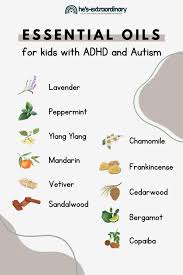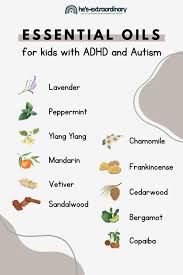Essential oils have gained popularity for their potential therapeutic benefits, including for individuals with Autism Spectrum Disorder (ASD) and Attention Deficit Hyperactivity Disorder (ADHD). While research regarding essential oils for these conditions is limited and non-conclusive, some parents and caregivers have reported positive experiences.
Here’s a general overview of how essential oils might be used for Autism and ADHD:
For Autism
-
Calming Effects: Essential oils like lavender, chamomile, and sandalwood are often noted for their calming properties. Some parents use these oils to help manage anxiety, improve sleep, or create a soothing environment.
-
Sensory Processing: Individuals with autism might have heightened or diminished sensory sensitivities. Essential oils can be used to create sensory experiences that might be comforting or stimulating, depending on the individual’s needs.
-
Routine and Consistency: Establishing a routine with essential oils, like using them in a specific time of day or during certain activities, might help provide a sense of predictability and comfort.
For ADHD
-
Focus and Attention: Essential oils such as peppermint and rosemary are sometimes used to enhance concentration and mental clarity. The invigorating scents may help with focus during tasks or activities. If someone has a sensitivity to peppermint It can be diluted. Rosemary is milder and does not irritate the skin or Olfactory where the sense of smell is generated.
-
Stress Relief: ADHD can be associated with high levels of stress or restlessness. Essential oils with calming properties, like lavender or ylang-ylang, may help manage these symptoms.
Considerations
-
Safety: Always use essential oils safely. They should be diluted before application, and it’s important to do a patch test to avoid skin reactions. Some oils might not be suitable for children or individuals with specific health conditions.
-
Consult Professionals: It’s crucial to consult healthcare professionals, such as a pediatrician or a therapist familiar with autism or ADHD, before starting any new treatment or therapy, including essential oils.
-
Individual Responses: Responses to essential oils can vary widely. What works well for one person might not be effective for another, so it’s often a process of trial and error. if one doesnt work as desired try another. (I have and can provide samples, generally)
While essential oils are not a substitute for established treatments and therapies for autism and ADHD, they might offer additional support for some individuals. The anecdotal evidence and personal experiences shared by parents and caregivers can be valuable, but they should be considered alongside professional medical advice.
While individual responses can vary, having a curated list based on research and parent feedback is valuable. Here are some commonly reported essential oils that may be beneficial for kids with Autism and ADHD, based on various sources and anecdotal evidence:
While individual responses can vary, having a curated list based on research and parent feedback is valuable. Here are some commonly reported essential oils that may be beneficial for kids with Autism and ADHD, based on various sources and anecdotal evidence:
But, Before You Buy Essential Oils…
-
- You should Understand Essential Oils
- Become aware of Safety and Precautions
- Know how to discover the Quality and Purity of Essential Oils
- Understand t he importance of Consulting Healthcare Professionals
- Know how to Conduct Patch Tests and Monitor Reactions
- Then WHY Use Essential Oils for ADHD and/or Autism?
-
- For Potential Benefits of Essential Oils
- For ADHD: Enhancing Focus, Managing Restlessness, Reducing Stress
- For Autism: Calming Effects, Improving Sleep, Sensory Integration
- If you know anyone with a family member with Autism or ADHA you might ask them about Anecdotal Evidence and Parent Testimonials
- Combining Essential Oils with Other Therapies need to be accetable to the person using them. (Again, that’s why it may be a good idea to buy several samples)
- Understand the Research and Limitations
- The benefits from a company who works with essential oils and provided their findings had this to report.
- For Potential Benefits of Essential Oils
- 84%Â of parents with Autistic children have reported medium to significant overall benefits
- 61% reported that the oils helped pacify their child during Meltdowns or Sensory Overloads.
- 77% parents have reported reduced hyperactivity levels in their kids upon usage
- 56% parents felt that their child was more relieved from anxiety, stress, attention deficit and anger
- 79% parents reported reduced discomfort due to sensory sensitivity
- Most importantly, 88% were happy with the overall effects and said they would recommend other parents to try out as well.
Complexity of Cognitive Disorders
- Multifactorial Nature: ADHD and ASD are complex conditions with a range of symptoms and underlying causes, including genetic, neurological, and environmental factors. Effective treatment often requires a multi-faceted approach that includes behavioral therapy, educational interventions, and, in some cases, medication.
- Symptom Management: Essential oils might help manage certain symptoms, such as anxiety or difficulty sleeping, but they do not address the underlying neurological and developmental aspects of cognitive disorders.
- Not a Substitute for Medical Treatment: Essential oils should be used as a complementary therapy rather than a substitute for established treatments. They can support overall well-being and help manage some symptoms, but they do not replace the need for evidence-based medical and psychological interventions.
- Integration with Other Therapies: Effective management of cognitive disorders typically involves a combination of therapies, including behavioral strategies, educational support, and sometimes medication. Essential oils might be used alongside these treatments but are not a standalone solution.
-
-
Safety and Regulation Concerns
-
-
- Quality Control: The essential oil industry is not tightly regulated, and the purity and quality of products can vary significantly. There is a risk of using oils that are adulterated or contaminated, which can lead to adverse effects.
- Potential Side Effects: Essential oils can cause allergic reactions, skin irritation, or other side effects, especially if used improperly. Ensuring safe and appropriate use is crucial.
5. Need for Professional Guidance
- Consultation Required: It is essential to consult with healthcare professionals, such as doctors or therapists, before integrating essential oils into a treatment plan. They can help determine the appropriate use and ensure it complements other therapies effectively.
Summary
Essential oils can offer supportive benefits, such as stress reduction and improved sleep, which may indirectly help individuals with ADHD and ASD. However, they are not a cure and should be considered part of a broader, multi-disciplinary approach to managing these conditions. Ongoing research and professional guidance are essential in determining their role and effectiveness in treatment plans.



